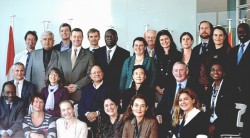Sixth course on Leadership for Peacebuilding
‘Leadership’ is not a self-evident characteristic of those in a senior position: ‘leadership’ is ultimately in the eye of the beholder and cannot exist without ‘followership’. People can be made to ‘follow’ through a transactional approach of rewards and punishments, but true ‘leadership’ resides in the ability to inspire and make others join in because they become more deeply motivated. ‘Leadership’ does not come only from those at the top of the hierarchy but can be exercised by anyone at any level. It is the circumstances that shape the ‘leadership’.
This year was the sixth edition of the annual course organized and delivered in partnership by the Human Security Division of the Swiss Federal Ministry of Foreign Affairs, the Geneva Centre for Security Policy, IPAT (the International Peacebuilding Advisory Team – an initiative of Interpeace) and UNITAR.
The course brought together twenty participants (ten women and ten men) in a deliberately diverse group of civilians and uniformed personnel, from the ‘global north’ and ‘global south, and from governmental, intergovernmental and non-governmental organizations. This year, the participants came from Afghanistan, Austria, the Central African Republic, Egypt, Iraq, Israel, Kosovo, Mali, the Netherlands, Nigeria, South Sudan, Slovakia and Switzerland.
While some people may have a more natural disposition towards behaviours that are often associated to ‘leadership’, ‘leadership’ can also be learnt. Every one of us needs to learn to master different leadership styles and be able to choose the most appropriate one for a particular situation.
With the help of Dr Samuel Bendahan of the University of Lausanne, participants deepened their understanding of ‘leadership’ and ‘leadership styles’, while Ms Simone-Eva Redrupp-Durand – a consultant on cross-cultural leadership – provided insights and tips on how to exercise leadership among people of different cultures – which can equally be associated to different ‘organizational cultures’.
This year the course was lengthened of half a day (total of 4.5 days), so as to dedicate some time to the question of ‘gender and leadership’, which had not yet been broached within the context of the course. The research – presented by Dr. Marika Fenley from the University of Lausanne – indicates that there are no significant differences between men and women in terms of the ‘traits’ that are typically associated with ‘leadership’, nor in the leadership styles that men and women tend to exercise. Yet, women in senior positions continue to face the challenge that their behaviours are often differently interpreted and evaluated than those of men. This is the result of stereotypes about gender roles that persist more than we realize, even in societies with an ostensibly high level of gender equality. Actively pursuing gender parity is a necessary strategy to combat gender discrimination. We can however also reframe the issue by focusing not on ‘men’ and ‘women’ but simply on talent and performance.
The course is however not an ‘academic’ one. This year, participants explored leadership challenges through case studies offered by three mentors: former Force Commander General Robert Gordon, Dr. Funmi Olonisakin and former UN Special Representative of the Secretary-General Youssef Mahmoud. They also practiced effective communication, a necessary – albeit not sufficient – characteristic of ‘leadership, and benefitted from reflections and advice on a personal challenge that each participant brought to the course.

